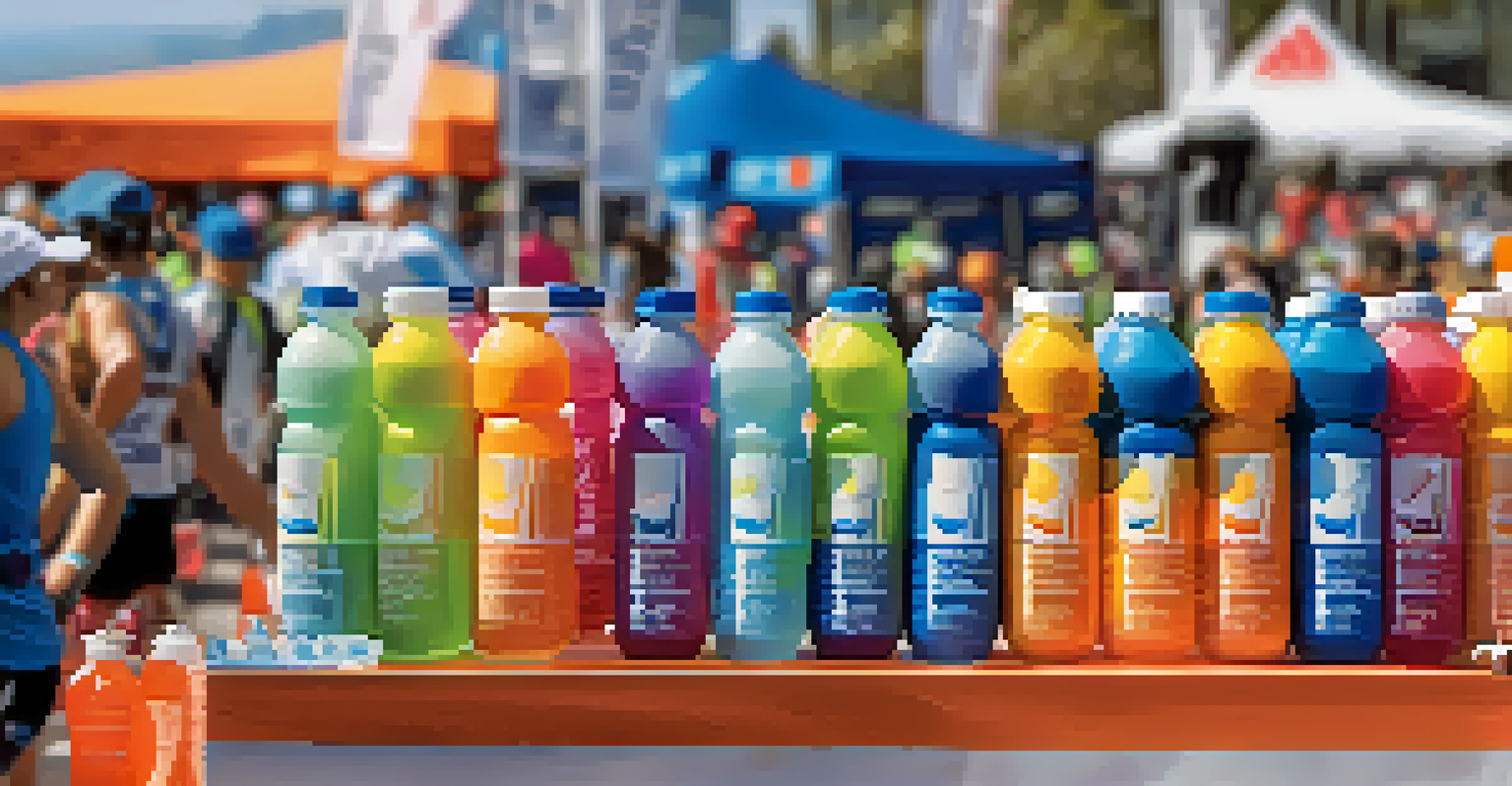Nutrition Strategies from Bodybuilding for Endurance Athletes

Understanding the Nutritional Needs of Endurance Athletes
Endurance athletes, like marathon runners and cyclists, have unique nutritional needs that differ from those of bodybuilders. While bodybuilders focus on muscle gain and recovery, endurance athletes prioritize sustained energy and stamina during long workouts. This means a greater emphasis on carbohydrates, which serve as the primary fuel source for extended physical activity.
Nutrition is not just about eating, it's about learning to live.
Incorporating appropriate macronutrient ratios is crucial for endurance athletes. Typically, they require about 60-70% of their daily calories from carbohydrates, 15-20% from protein, and 15-20% from fats. This balance ensures they have enough energy for endurance training while still supporting muscle repair and overall health.
Understanding these needs allows endurance athletes to tailor their diets effectively. By learning from bodybuilding nutrition strategies, they can optimize their performance and avoid the pitfalls of inadequate fueling, such as fatigue and decreased endurance.
Carbohydrate Loading: A Key Strategy for Endurance
Carbohydrate loading is a strategy borrowed from bodybuilding that can significantly benefit endurance athletes. The concept involves increasing carbohydrate intake in the days leading up to an event, allowing the body to store more glycogen in muscles. This stored glycogen acts as a readily available energy source during long races or training sessions.

Typically, athletes might increase their carbohydrate consumption to 70% of their total caloric intake for about three days before an event. Foods like pasta, rice, and potatoes are excellent choices for this phase. This technique can be particularly effective for events lasting longer than 90 minutes, where glycogen depletion is a real concern.
Tailored Nutrition for Endurance
Endurance athletes need a diet rich in carbohydrates, with appropriate ratios of protein and fats, to enhance their performance and recovery.
However, carbohydrate loading requires careful planning to avoid gastrointestinal discomfort. Athletes should experiment with their carbohydrate intake during training to find what works best for them, ensuring they can maximize their performance on race day.
Protein Timing: Fueling Recovery and Performance
Just like bodybuilders, endurance athletes must pay attention to protein timing to enhance recovery and performance. Consuming protein after workouts helps repair muscle damage and promotes growth, which is essential for endurance athletes who often push their limits. A common recommendation is to consume protein within 30 minutes after exercising for optimal results.
You are what you eat, so don't be fast, cheap, easy, or fake.
Endurance athletes generally require about 1.2 to 1.4 grams of protein per kilogram of body weight daily. This can come from various sources, including lean meats, dairy, and plant-based options like beans and legumes. Incorporating protein shakes or bars can also be a convenient way to meet these needs, especially after long training sessions.
By prioritizing protein intake, endurance athletes can enhance their recovery and ensure their bodies are prepared for the next training session. This approach mirrors bodybuilding strategies, where timing and nutrient combinations are crucial for muscle development.
Hydration Strategies: Staying Ahead of the Game
Hydration is a vital component of both bodybuilding and endurance sports, but the strategies can differ. Endurance athletes often face longer durations of physical activity, making it essential to maintain fluid balance. This involves not just drinking water but also incorporating electrolytes to replenish what is lost through sweat.
Bodybuilders typically focus on hydration around their workout sessions, while endurance athletes must plan for hydration before, during, and after their events. A good rule of thumb is to drink about 500 ml of water two hours before exercise and continue sipping throughout the activity. Sports drinks can be beneficial for longer efforts, providing necessary fluids and electrolytes.
Carbohydrate Loading Benefits
Implementing carbohydrate loading before events allows athletes to maximize glycogen stores, providing essential energy for long-duration activities.
Understanding when and how much to hydrate can make a significant difference in performance. By adopting hydration strategies from bodybuilding, endurance athletes can avoid dehydration and maintain peak performance levels.
Healthy Fats: Fueling Endurance without Gaining Weight
Healthy fats play an essential role in the diets of both bodybuilders and endurance athletes. While bodybuilders often limit fat intake to promote muscle definition, endurance athletes can benefit from incorporating healthy fats for sustained energy. Fats are particularly important during longer, low-intensity workouts when the body shifts to fat oxidation for fuel.
Sources of healthy fats include avocados, nuts, seeds, and olive oil. These fats not only provide energy but also support overall health and help with the absorption of fat-soluble vitamins. Balancing fat intake can lead to improved endurance and better overall performance.
Endurance athletes should aim for about 20-35% of their total daily calories from healthy fats. By mimicking bodybuilding strategies of incorporating fats wisely, they can enjoy the benefits without compromising their performance.
Meal Frequency: Smaller Meals for Sustained Energy
Meal frequency is another area where endurance athletes can learn from bodybuilding practices. While bodybuilders often eat multiple meals a day to fuel muscle growth, endurance athletes can benefit from frequent, smaller meals to maintain energy levels throughout the day. This approach helps prevent the energy crashes that can occur with larger, infrequent meals.
For endurance athletes, aiming for 5-6 smaller meals a day can provide a steady supply of energy while also supporting recovery. Each meal should include a mix of carbohydrates, protein, and healthy fats to optimize performance. This strategy can help keep metabolism active and reduce hunger during long training sessions.
Hydration is Key to Performance
Maintaining proper hydration and electrolyte balance is crucial for endurance athletes to prevent dehydration and ensure optimal performance during extended workouts.
By adopting this meal frequency strategy, endurance athletes can ensure they are adequately fueled for their workouts. It’s a practical approach derived from bodybuilding that can enhance overall performance and well-being.
Supplements: Enhancing Endurance Performance
Supplements are a common topic in both bodybuilding and endurance training, but their use should be approached with care. Just like bodybuilders, endurance athletes might consider supplements to support their performance and recovery. Popular options include branched-chain amino acids (BCAAs), creatine, and electrolyte tablets.
BCAAs can help reduce muscle soreness and improve recovery times, while creatine has been shown to enhance performance in high-intensity efforts. Electrolyte supplements can help maintain hydration during long workouts, especially in hot conditions. However, it’s important to remember that supplements should complement a balanced diet rather than replace it.

Before integrating any new supplement into their routine, endurance athletes should consult with a healthcare professional or nutritionist. This ensures they are using supplements safely and effectively, maximizing their potential benefits without compromising health.
Monitoring and Adjusting Nutrition for Optimal Performance
Finally, monitoring and adjusting nutrition is crucial for both bodybuilders and endurance athletes. What works for one athlete might not work for another, so it’s essential to track dietary intake and performance. Keeping a food journal can help endurance athletes identify which foods and strategies yield the best results for their specific needs.
Regularly assessing energy levels, recovery times, and overall performance can provide valuable insights. By paying attention to how their body responds to different foods, athletes can make informed decisions about their nutrition strategies. This iterative process is key to finding the right balance.
Ultimately, the goal is to optimize nutrition for peak performance. By borrowing effective bodybuilding strategies and tailoring them to their endurance needs, athletes can set themselves up for success in their training and competitions.